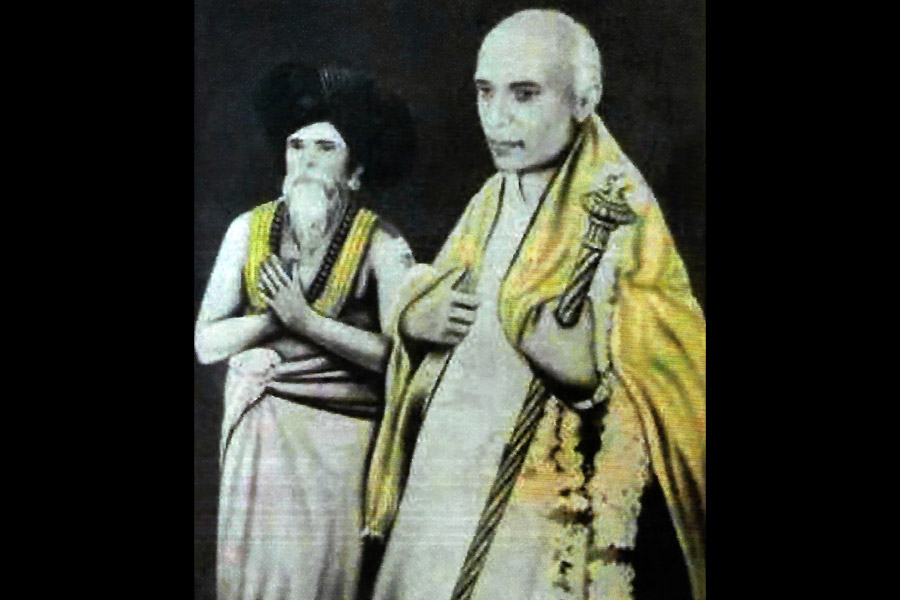The ceremonial sceptre 'Sengol' that was given to first prime minister Jawaharlal Nehru to symbolise the transfer of power in August 1947 was kept in the Nehru Gallery of the Allahabad Museum and has been moved to Delhi for its installation in the new building of Parliament, official sources have said.
Made of silver with a coat of gold, the historical sceptre will be installed near the chair of the Lok Sabha Speaker on May 28, the same day the new Parliament building will be dedicated to the nation by Prime Minister Narendra Modi.
Addressing a press conference here, Union Home Minister Amit Shah said Sengol symbolises the transfer of power from British to India, just as it was originally used to mark the handing over power from one king to another during the Chola dynasty in Tamil Nadu.
He later also launched a website sengol1947ignca.in which has background information on its significance, along with short documentaries. A small film on Sengol and the transfer of power, based on media reports of that time, was also played during the press conference.
"Our government is of the opinion that keeping this sacred 'Sengol' in a museum is inappropriate. For installation of the 'Sengol', no other place can be more suitable, sacred and appropriate than the building of Parliament," he told reporters.
So, when the new Parliament building will be dedicated to the nation, on the same day, Modi, with a lot of humility, will accept the Sengol from an Adheenum from Tamil Nadu, and "with a lot of respect, will place it near the chair of the Lok Sabha Speaker", Shah said.
The Adheenams – a non-brahmin Saivite order – date back over five hundred years. The transfer of power during Chola times was sanctified by Saivite high priests. C Rajagopalachari had then requested the leader of the Thiruvavaduthurai Adheenam in Tamil Nadu (then Madras Presidency) to do the same, for power to pass on to Indian hands from the British, according to information provided on the new website.
The leader of the Adheenam immediately commissioned jeweller Vummidi Bangaru Chetty for the preparation of the 'Sengol' (five feet in length). The official website of Vummidi Bangaru Jewellers, mentions about the sceptre and also carries a rare photograph of Nehru that is also featured in the short film on Sengol.
Vummidi Ethirajulu, 96, and Vummidi Sudhakar, 88, two people involved in the making of the original Sengol are expected to attend the new Parliament building inauguration function.
Official sources here told PTI on Wednesday that the Sengol has been "moved to Delhi from the Allahabad Museum".
"The ceremonial sceptre was kept at the Allahabad Museum, along with several other historical objects associated with Jawaharlal Nehru, as part of the Nehru Gallery of the museum," a source said.
The foundation stone of the present building of the museum was laid on December 14, 1947 by Nehru and it was opened to the public in 1954 at the time of Kumbh Mela, a senior official of the museum said.
The two-storey building is located in Chandrashekhar Azad Park (earlier Alfred Park) of the Company Bagh area in Allahabad (now Prayagraj).
The museum has 16 galleries, including terracotta gallery, archaeological gallery, miniature painting collection, modern Indian panting collection, and arms, armour and bronze collection. Nehru Gallery is located on the first floor.
In the year 1986, after realising the significance of the diversity of its rich collections of archaeological artifacts, art treasures, the museum was taken over by the Ministry of Culture, after constituting an autonomous body called Allahabad Museum Society, and declared it a museum of national importance under the Ministry of Culture, according to the museum's website.
At present, the museum is under the financial control of the Ministry of Culture. The Allahabad Museum had recently taken part in the three-day International Museum Expo held in Delhi, which was inaugurated by Modi on May 18, coinciding with the International Museum Day.
"The Nehru Gallery has among other rare items, the original manuscripts of Nehru's autobiography -- volumes I and II, various caskets an ceremonial addresses given to him at many events, gifts and other souvenirs. One of the objects is a sandalwood-made chariot depicting Arjuna led by Lord Krishna, gifted to Nehru by Hubli Municipal Corporation," another senior official of the museum told PTI, on the condition of anonymity.
Sengol is a word derived from the Tamil word 'Semmai', meaning 'righteousness.' The ornamental sceptre is crowned with the sacred Nandi, with its unyielding gaze. The Nandi on top of the 'Sengol' is symbol of 'nyaya.' "Sengol represents the same feeling that Jawaharlal Nehru felt on August 14, 1947," Shah said.
Except for the headline, this story has not been edited by The Telegraph Online staff and has been published from a syndicated feed.










